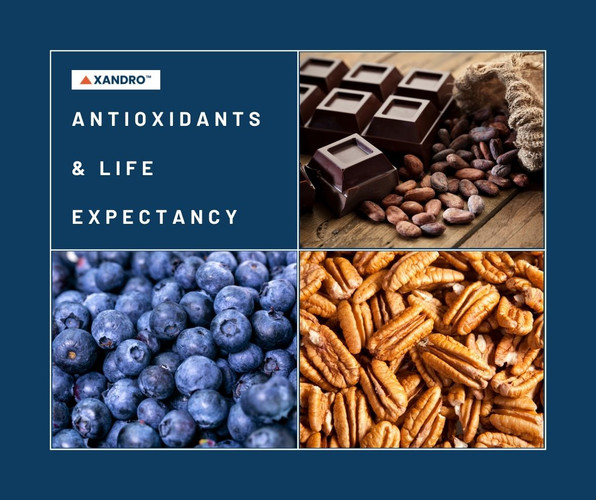Why are antioxidants thought to extend life expectancy?
6th Jan 2024
How Do Antioxidants Help Us Live Longer?
If you’ve read many of our blog posts, you would have heard us mentioning antioxidants regularly. It’s even in our longevity post (read here).
In this post, we will discuss the role of antioxidants on longevity and answer questions, including:
- What is the Role of Antioxidants in Living System?
- Why Do Antioxidants Prevent Aging?
- How Do Antioxidants Increase Longevity?
- Do Antioxidant Supplements Increase the Risk of Mortality or Chronic Disease?
Antioxidants can prevent and neutralise the damaging effect of free radicals, including:
- Inflammation in the joints, i.e., arthritis
- Damage to nerve cells in the brain, contributing to conditions like Parkinson’s or Alzheimer’s disease
- Deterioration of the eyes lens, contributing to vision loss
- Certain cancers caused by damaged cell DNA
- Increased risk of coronary heart disease, as free radicals encourage LDL cholesterol to stick to artery walls.
In this way, antioxidants are good for you because they help slow down the aging process.
As we age, a process called oxidation occurs inside our bodies. It’s where the body produces unstable chemicals called free radicals, which damage our cell membranes and other structures, such as cell proteins, lipids and DNA.
While our bodies need some free radicals to function, the damage caused by excess free radicals can lead to irreversible damage. These free radicals have been linked to a variety of diseases, including heart disease and cancer, leaving many to conclude that free radicals are a cause of aging in the human body.
This is where antioxidants come in. Antioxidants scavenge and neutralise these free radicals.
While oxidation can speed up from factors like stress, smoking, alcohol, sunlight and pollution, antioxidants are compounds found in certain foods that may prevent the damage from these free radicals.
These include nutrient antioxidants, vitamins A, C and E, and the minerals copper, zinc and selenium. There are also non-nutrient antioxidants, such as phytochemicals in plants, like lycopenes in tomatoes and anthocyanins in cranberries, that are thought to have a greater antioxidant effect than vitamins or minerals.
People take antioxidant supplements to do the opposite; reverse the risk of mortality or chronic disease.
Some dietary antioxidants (those coming from foods we eat) also come as antioxidant supplements, such as beta-carotene, lycopene and vitamins A, C and E, so as long as the recommended daily intake is taken, there should be no increase in adverse effects.
This can change if you have cancer, as your body is undergoing different treatments and is trying to heal itself, and taking supplements may negatively affect that. Always talk with your doctor before taking any dietary supplement, as some preclinical studies have found that increased antioxidants can actually promote tumour growth. More research is needed about the effects of antioxidant supplements in cancer patients.
In laboratory and animal studies, on the other hand, increased antioxidants have been found to prevent free radical damage that is associated with cancer development, but more controlled clinical trials are needed for humans.
For example, while some human studies have found that vitamin C and molybdenum supplementation was linked with decreased stroke mortality, others have found that increased antioxidant supplementation may increase mortality.
Therefore, at this stage, make sure you’re getting your recommended daily intake of vitamins and minerals, and speak with your doctor before adding new supplements to your regime. While rare, if you have a vitamin A, C or E deficiency, you will need to take supplements to boost these levels.
Some dietary supplements that aren’t straight antioxidants can be high in antioxidants, and this is generally seen as an added bonus, especially for those days when you’re not eating enough foods with antioxidants. The amounts of these compounds in these supplements are generally not high enough to have adverse effects.
A balanced diet of a variety of healthy foods is best to help with longevity. It’s important to learn about the nutrients that are essential for a healthy and functioning body.
If you would like to learn more about the foods you can find antioxidants in, read our list of vitamins, minerals and compounds to learn about their sources and dosages.
We hope you’ve learned a bit about why antioxidants are good for your body! Be sure to check out Xandro Lab’s dietary supplements high in antioxidants, including Curcumin, Trans-Resveratrol and POM-Q10!
